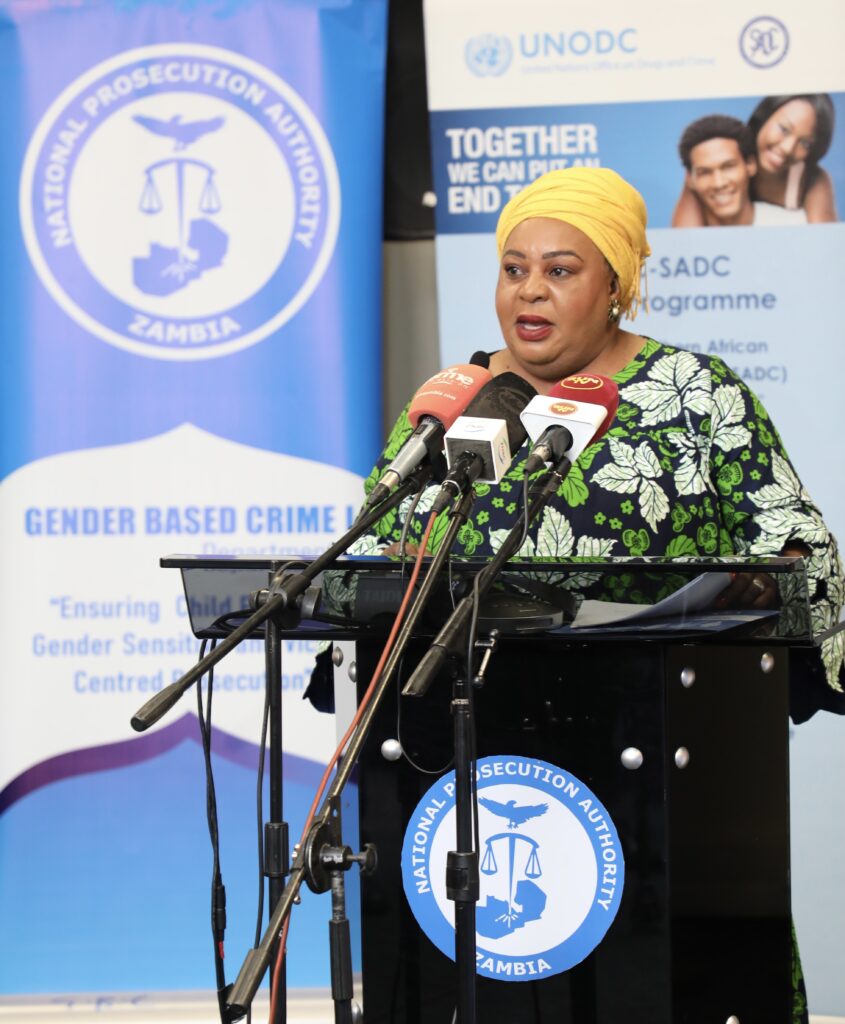This Is the Moment – Zambian Government Urges Southern Africa’s Heads of Prosecution to Lead the Charge Against Gender-Based Violence
A Survivor’s Voice at the Forefront – Minister Mwamba Shares Her Story to Inspire Prosecutorial Action
Livingstone, Zambia | June 2025
Moments after Honourable Madam Justice Catherine Lombe Phiri delivered her opening remarks and eloquently set the stage for urgent and collaborative action, she invited the Guest of Honour, Minister of Community Development and Social Services, Honourable Doreen Mwamba, MP, to address the Forum. What followed was a powerful and deeply personal speech, one that moved the room and redefined the tone of the gathering.
In a message that was both impassioned and purposeful, Minister Mwamba issued a stirring appeal to the region’s heads of prosecution – This is the moment. Stand up. Take action. Cement your commitment.
But it was not only the clarity of her call that struck a chord – it was the courage of her candour.
With grace and conviction, the Minister revealed that she, too, had survived gender-based violence. As a woman rising in politics, she endured physical abuse at the hands of her husband – punishment for daring to lead in the male-dominated space of politics. Her testimony brought a poignant stillness to the room and served as a piercing reminder – GBV knows no boundaries. It touches every class, every institution, every nation.
Her disclosure transformed the meeting from a formal convening into something far more personal and powerful. It was a moment of reckoning and a call to the heads of prosecutions not only to prosecute but to listen, lead, and reform with empathy and urgency.
Speaking as Guest of Honour at the second in-person Southern Africa Heads of Prosecution (SAHOP) Annual General Meeting, the Minister challenged prosecution authorities across the region to move from commitment to implementation – turning frameworks into tangible protection for women and girls.
“Despite laws in place, gender-based violence remains alarmingly high,” she said. “We cannot wait any longer. Let this meeting be the turning point.”
Held under the theme “Innovative Criminal Justice Practices: Strengthening Regional Collaboration to Combat Gender-Based Violence,” the Forum brought together leaders from 16 countries to rethink how justice systems respond to GBV. The Minister observed that the heads of prosecution are central to this effort and must evolve to meet the moment.
“Criminal justice institutions are key to fighting this deeply rooted vice,” she said, “one which stems from historically entrenched gender inequality and imbalanced social power between men and women.”
Innovation, Partnerships, and Breaking Barriers
The Zambian government, she stressed, is urging prosecution services across Southern Africa to explore innovative practices and forge partnerships with non-traditional allies – from community influencers to faith leaders in order to shift societal norms and expand the reach of justice.
Ms Mwamba acknowledged the structural and operational barriers that hinder effective prosecution of GBV cases, including underreporting, survivor disengagement, stigma, and capacity gaps within justice systems.
“It is quite clear that the prosecution of GBV remains elusive due to many factors that present critical barriers across the SADC region,” she said. “This is the moment to stand up against gender-based violence, and cement our commitments and actions toward its elimination.”
She expressed optimism in Zambia’s approach, particularly its emphasis on prevention. Through community engagement, advocacy with traditional and religious leaders, and deliberate investment in public education and social protection, Zambia is tackling the cultural and economic drivers of violence at their roots.
Minister Mwamba highlighted key reforms and achievements that position Zambia as a leading voice in the regional response to GBV:
- Establishment of GBV fast-track courts in all ten provinces
- A specialised Gender-Based Violence Unit at the National Prosecution Authority
- Free access to education and healthcare
Enhanced social protection mechanisms - Legislative reforms, including the Children’s Code Act, the amended Marriage Act, and the Anti-Gender-Based Violence Act
- Ongoing revision of the National Gender Policy.
“These interventions are designed not just to punish perpetrators,” she said, “but to create conditions in which women and girls are protected, heard, and empowered.”
As the SAHOP Forum unfolds in Livingstone, Honourable Mwamba’s story has brought new urgency to the conversations and added moral clarity to the prosecutorial mandate. Her call was not just about better court outcomes – it was about rebuilding systems that dignify survivors and transform communities.
“Every instance of violence sets back a family, a community, and an economy,” she reminded delegates. “Justice is not just a legal imperative – it’s a development necessity.”
And with that, she closed with a call that continues to echo beyond the conference walls:
“Let us turn dialogue into action. Let this be the moment we move from conviction to transformation.”

